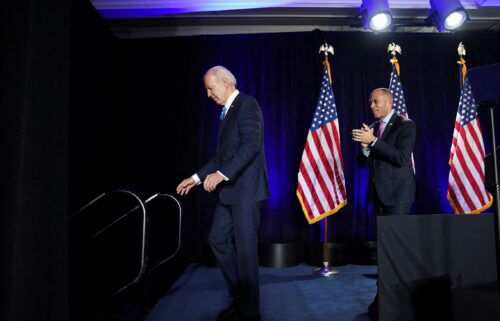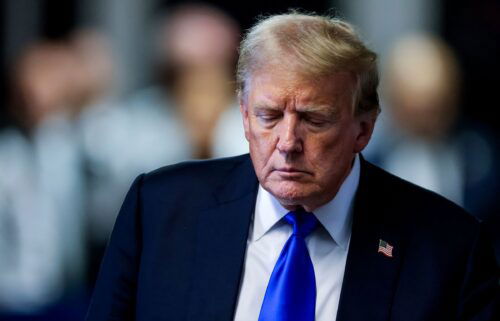The big question facing Democrats (and independents): Who to vote for

We’ve reached the phase of the Democratic primary where the early states have had their say. (The last one, South Carolina, was on Saturday.) Now comes Super Tuesday, when large numbers of people all around the US will start casting their votes in the Democratic primary. Millions of them have already started voting.
Find out when your state votes.
The burning question. The question I get most often from friends and family during this period every four years is this: “Who should I vote for?”
So sorry! I’ll write here what I tell them: I can’t tell you that. CNN does not endorse candidates. We strive for impartiality. It’s not my role to tell you what to believe, or what to do with your ballot.
Here’s what I can do. I can lay out for you what we know about the level of support for each campaign, and the conventional wisdom (or unconventional wisdom) for why they’re still in the race. This year, of course, the action is all on the Democratic side. President Donald Trump has the Republican nomination locked up.
Extremely important note before we get started. While CNN and other media outlets may project a popular vote “winner” for South Carolina and each of the other 13 states voting this Tuesday, the delegates are allotted proportionally to any candidate who gets more than 15% of the vote. That’s the case for every Democratic primary and caucus. What that means: Unlike the general election, nothing in the primary is winner-take-all.
So the primaries might not produce a clear nominee. Since candidates can amass delegates even if they don’t win any states outright, the fractured Democratic field might stay that way all the way until the convention in July, when it’s possible that no one candidate will have a majority of the delegates. Read about a brokered convention.
Now, time for some questions.
Can you vote in the Democratic primary?
Primaries for both parties have gotten more and more open in recent years, but every state has different rules. Here’s a state-by-state guide from the National Conference of State Legislatures.
Closed primaries — In some states, voters must already be registered in order to take part in a primary. States with closed primaries include Pennsylvania, Massachusetts, Kentucky and New York. In 2016, Trump’s children couldn’t vote for him in the New York primary because they weren’t, at that time, Republicans. So check your voter registration.
Partially closed primaries — As one example, let’s look at California, where things get really confusing. For most offices, California has a nonpartisan top-two primary system (also known as a jungle primary). That’s how you end up with so many Democrat vs. Democrat races in California on Election Day. But for the presidential election, the primary is partially closed. That means that independents — voters who are called “no party preference” in California — can vote in the Democratic primary, but they must specifically request a ballot with presidential candidates listed. If you’re a Republican or involved with some other political party, you must change your registration as you vote, and your vote will be counted provisionally (or after your new registration is confirmed). This means we may not know the final results from California until a while after Election Day. But again, every state is different.
Open primaries — In other states — Virginia and Texas, for instance — voters can change their party alignments on Election Day and cast ballots in whatever primary they want.
Super Tuesday has been happening for days, because of voting by mail — CNN’s Kelly Mena reports that millions of voters cast their ballots before Tuesday in states like California, Texas, North Carolina and Colorado.
What are you looking for in a president?
An idealist –– Bernie Sanders is running on a clear platform and he has made it plain that he is not interested in compromise. Some people love that about him. But it’s also the thing that maddens so many establishment Democrats about him, because he’s running on a platform that seems impossible to enact. Take health care. His plan is to nationalize the health insurance industry. There’s not even a majority of Democrats in the Senate who support his “Medicare for All” proposal, much less a majority of all senators.
- Sanders envisions a different America — Medicare for All is just a start. He backs a $16 trillion-plus Green New Deal to fight climate change and completely transform the US economy away from fossil fuels toward renewable energy. Elizabeth Warren also supports this, along with free child care and free college tuition at public schools.
A realist — Democrats might actually be able to get a public health insurance option to compete in the current private insurance system. That’s a half measure that wouldn’t guarantee everyone has health insurance. It’s more than Obamacare accomplished. It’s less than Medicare for All. It’s what Joe Biden and Mike Bloomberg, with important variations, support. (So did Amy Klobuchar, who left the race and threw her support behind Biden on Monday.)
- Baby steps — Sanders and Warren’s goals are lofty. They’re not universally held. Do Sanders supporters really think he can get any of this done or is their support just to change the conversation? If you like what Sanders says, you should consider voting for him. But don’t expect all or any of his promises to come true.
A woman — What’s clear is that four years after coming so close to electing a woman president, barring a Warren turnaround it’s not happening this year. Who knows why Sanders has taken off as the progressive in the race and not Elizabeth Warren. But it’s worth noting that she started to flag in polls when she was attacked for supporting his Medicare for All plan.
- Sanders took from Warren — He hasn’t suffered at all for taking a few of her ideas — a wealth tax and free child care — and adopting them into his platform. Why has Biden turned out to be more viable than Klobuchar? If you’re ultimately going to vote for the Democrat, why not look at a woman in the primary? Both Warren and Klobuchar have highlighted their gender on the campaign trail.
What’s your top issue?
Health care — There’s a lot of variation among the Democrats on this issue, but all agree the government needs to do more to help Americans pay for health care and prescription drugs. But for some, that looks like nationalizing the health care industry (Sanders and Warren), while others want to provide a public option in the insurance system (Biden and Bloomberg). What’s achievable is up for debate. Warren, for instance, has said there may need to be steps toward a single-payer system. Sanders says his Medicare for All program is a compromise.
Climate change — Every Democrat recognizes climate change is happening and that humans contribute. They’ve got different ways to deal with it — from a Green New Deal to radically change the US economy to more modest steps. Mike Bloomberg, the most conservative Democrat running, is already spending millions of dollars of his own money on climate change. So is Tom Steyer.
Inequality — Here again, Sanders and Warren fall to the left of the field. They want to address inequality by providing free tuition at public colleges and universities and free child care and by taxing the wealthiest Americans. There are a variety of plans from the others, but almost everyone agrees some of the Trump tax cuts should be rescinded.
Guns — All of the Democrats agree there should be more restrictive gun control laws.
Get more information on each candidate and their specific vision at CNN’s Election Center.
Are you not a Democrat? Not a problem
Neither are all of the Democratic candidates!
On the left. Sanders, the front-runner, is still not technically a Democrat, although he’s on his second run for the Democratic nomination.
He is an independent in Vermont. Part of the reason he’s not a Democrat is that there is no party registration in Vermont. But that hasn’t stopped people like Sen. Patrick Leahy from proudly proclaiming themselves Democrats. Sanders describes himself as a democratic socialist. He has recently promised to do war with the Democratic establishment. If that’s your thing, Sanders is an option.
On the right. Sanders isn’t the only non-lifelong Democrat running in the race. While Sanders has insistently joined no party, former Mayor Bloomberg has joined all of them.
He was elected mayor in New York City as both a Republican and an independent. Now he’s registered as a Democrat and is using his billions not only to run for President, but also to push for gun control legislation and climate change action.
Are you a Republican?
Do you support Trump? — You can and probably should still take part in the primary process, where you can. In some states, including South Carolina, Republicans have canceled their primaries this year.
Do you oppose Trump? — He does face competition in former Massachusetts Gov. Bill Weld, although Weld has not gained much support.
Do you want to mess with Democrats? — In South Carolina, some Republicans have said they’ll try to mess with Democrats by voting for the candidate they think Trump will beat most handily. Trump has encouraged this type of behavior, in South Carolina and New Hampshire.
- Beware — This is a dangerous exercise since who really knows what’ll happen in November (remember 2016!?). But it is, technically, within the rules.
Do you want to mess with Trump? There’s also a school of thought that disaffected Republicans could leave the GOP and become Democrats for this primary. The conservative former Rep. Joe Walsh of Illinois, who is the national poster-person for never-Trump Republicans, has said that he would even support Sanders if Sanders wins the nomination. But you could consider Bloomberg or one of the other moderate Democrats running, if your state allows it.
What if you just want to beat Trump?
Which candidate is the most electable? Who knows! Let’s consider Sanders. The concern about Sanders is he has an uncompromising commitment to radically change the country. Also, he’s a democratic socialist. It’s true that socialism is unpopular with a large majority of Americans. And yes, Sanders is a proud democratic socialist (which is not a socialist!!! his supporters will tell you). But a person can be elected president who doesn’t share the views of most Americans. Trump did that.
Each candidate has an electability argument.
Mike Bloomberg is a moderate spending his own billions on expensive ads. He effectively led a major US city and built a massive company. But he’s part of the inequality problem.
Joe Biden can bring his Obama White House experience to his own administration. He’s the person if you pine for the Obama era.
Amy Klobuchar tried to appeal to moderates in the middle of the country.
Pete Buttigieg, who represented generational change, dropped out just before Super Tuesday.
Elizabeth Warren put up the most thoughtful and detailed plans and before she was a senator she was a consumer advocate.
Bernie Sanders is authentic. He’s been saying the same things about health care for decades. The party has moved toward him, not the other way around.
But there’s certainly data behind the notion that the moderate middle of the country decides most elections. Read this piece by CNN’s Ronald Brownstein. Sanders is the most vulnerable from that perspective.
And that’s why so many Democrats are nervous about him. That said, they haven’t coalesced around any more moderate Sanders alternative. I can’t tell you who, if anyone, voters will pick as that Sanders alternative. There may not be one.
Is Trump beatable? No one knows
Trump’s approval is, according to almost every poll, below 50%. It hovers in the low to mid-40s. That means there’s a majority of people out there who are unhappy with him. That makes him seem beatable.
But just like it’s delegates (not voters) who select the Democratic nominee, it’s the Electoral College (not voters) that picks the president. So an unpopular president with outsize support in certain areas and a fighting chance in Florida and the Rust Belt can win again.
But nobody will know if Trump is beatable until after the polls close in November.



